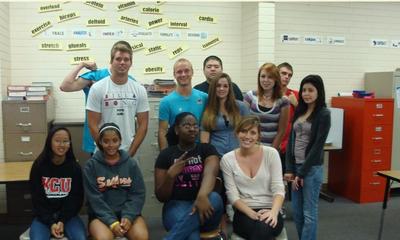|
|
Teens Making a Difference: Study Circles in Action
an article by Dr. Deri Joy Ronis
I first heard the saying, Think Global -- Act Local, over two
decades ago, and here we are in the 21st century continuing to practice
this art. Many schools are adopting programs aimed at helping students
to resolve conflicts non violently. Some of the successful programs for
this are known as Peer Mediation, Conflict Resolution, Mediation in the
Schools and Study Circles. The following photos are from some of the
students who have participated in these programs at Sarasota High School
in Sarasota, Florida.

click on photo to enlarge
With
several grants for these Study Circles in Healing Racism and Teaching
Tolerance, many of the students have gone on to graduate and enroll in
college or technical programs. Most students report feeling increased
self esteem and believing that what they do can make a difference.
Indeed, the next generation will lead us to what we hope will be a more
peaceful world to inhabit. Visit www.C-R-T.org.
Study Circles came out of the Clinton Townhall Initiative and
have been used widely all over the United States. The Study Circle
Resource Center is in Pomfret, CT. and they have changed the name to
Everyday Democracy.: Ideas and Tools for Community Change. Their
website is www.everyday-democracy.org and they have many wonderful complimentary resources that anyone who is interested in change can access.
Some of the avenues that I have used study circles in are with
community leaders in West Palm Beach, FL. to help heal racism. Out of
these multiple six week sessions a non profit emerged to provide
educational training for schools and colleges. It was called Towards a
More Perfect Union.
The Study Circle model is highly successful because all people
have a voice and the group conscience decides what projects that might
like to explore and work on together after each six week period.
Study Circles have been used at Lynn University in Boca Raton
with international and local students to resolve stereotypes and at
Galen University in San Ignacio, Belize with college students to remove
barriers and have an entire class choose five projects that made a
lasting difference, from placing garbage receptacles on local school
buses instead of people throwing garbage out the window, and domestic
violence information to be available at all hospitals, doctors offices
and schools. More recently in Sarasota, there have been six study
circles over a three year period with students at Sarasota High school,
some of whom are seen in the photo above.
|








|
DISCUSSION
Question(s) related to this article:
Youth speaking to youth on peace
Do you know of other examples?
Thematic forum(s) in which this article is being discussed:
PEACE EDUCATION - EDUCATION POUR LA PAIX - EDUCACION PARA LA PAZ
Latest reader comment:
Readers's comments are invited on this report and question.

|
|
|
This report was posted on June 24, 2011.
If you wish to start a new discussion topic on this article, please copy the title of this article which is Teens Making a Difference: Study Circles in Action and its number which is 485 and enter this information along with your discussion question and an introductory response to the question here.

A few stories are retained on the main listings if they are considered
by readers to be a priority. If you have not already done so, please
take the time to check a box below: should this article be considered as
a priority?

|







